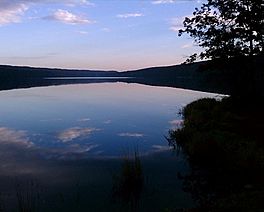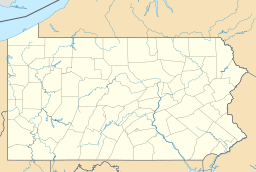Meadow Grounds Lake facts for kids
Quick facts for kids Meadow Grounds Lake |
|
|---|---|

Meadow Grounds Lake
|
|
| Location | Fulton County, Pennsylvania, United States |
| Coordinates | 39°55′26″N 78°03′28″W / 39.92389°N 78.05778°W |
| Primary inflows | Roaring Run |
| Basin countries | United States |
| Surface area | 204 acres (0.8 km2) |
| Max. depth | 39 ft (11.9 m) |
| Settlements | McConnellsburg |
Meadow Grounds Lake is a large lake in Fulton County, Pennsylvania. It was finished in 1965. This lake is actually a reservoir, which means it's a man-made lake used to store water. It covers about 204 acres of land.
The lake and its dam are located within State Game Lands 53. This land is managed by the Pennsylvania Game Commission. However, the dam and lake areas are looked after by the Pennsylvania Fish and Boat Commission (PFBC).
About Meadow Grounds Lake
The Pennsylvania Fish and Boat Commission (PFBC) designed and built the dam for Meadow Grounds Lake. The construction of the dam was completed in June 1964. The PFBC is in charge of making sure the dam works safely and is kept in good condition.
The dam is considered a very important structure by the Pennsylvania Department of Environmental Protection. This means it needs careful attention to ensure it remains safe. The water that flows into the dam comes from an area of about 3.2 square miles, mainly from a stream called Roaring Run.
How the Dam Works
The dam is made of packed earth and creates the 204-acre lake. When the lake is full, it holds a lot of water. The dam is 39 feet tall and 530 feet long.
The lake's water level is kept steady throughout the year. This is done using special channels called spillways. There's a main spillway and an extra one. The extra spillway is a concrete channel cut into the rock. It helps release extra water safely if the lake gets too full.
Why is Meadow Grounds Lake Drained?
Currently, Meadow Grounds Lake is being drained. This means the water level is being lowered. The lake will stay drained until money is found to fix the dam.
It is estimated that these repairs will cost a lot of money, somewhere between $2.25 million and $3 million. Once the necessary funds are available, the repairs can begin, and the lake can be refilled.
 | DeHart Hubbard |
 | Wilma Rudolph |
 | Jesse Owens |
 | Jackie Joyner-Kersee |
 | Major Taylor |



